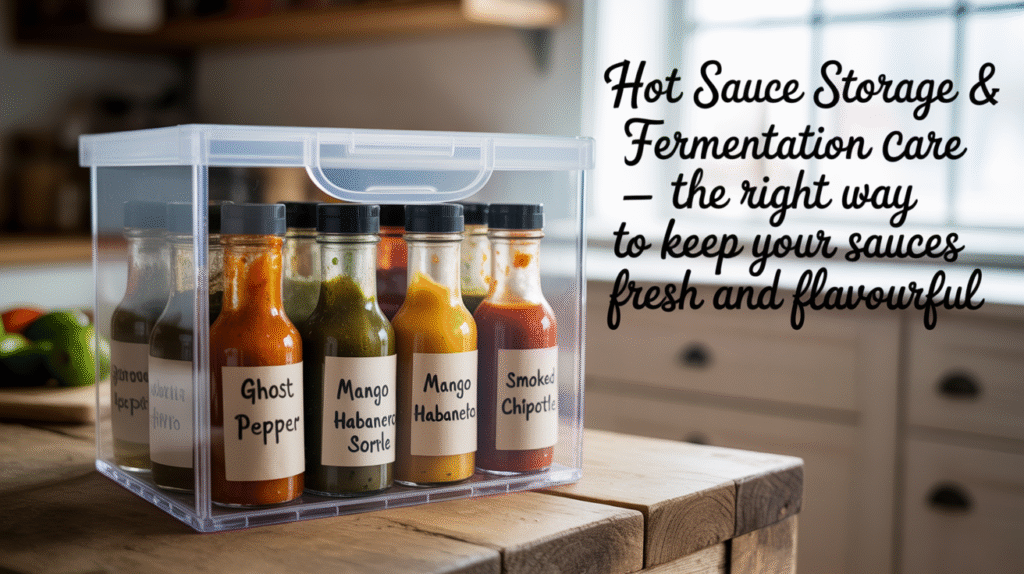Affiliate Disclosure: PantryBrands.co.uk is a participant in the Amazon.co.uk Associates Programme. As an Amazon Associate, we earn from qualifying purchases made through links on this site.
The best way to store hot sauce is in a cool, dark place or in the fridge, especially after opening. Proper storage not only maintains flavour and texture but also preserves the shelf life and safety of both fermented and non-fermented sauces. If you’re crafting your own hot sauces or simply want to protect the ones you buy, understanding correct storage and fermentation care ensures your sauce stays as good as the day it was bottled.

Why Proper Hot Sauce Storage Matters
Hot sauce contains active ingredients like capsaicin, vinegar, and sometimes live cultures (in fermented versions) that can degrade or spoil if not stored correctly.
Main Reasons to Store Hot Sauce Properly
Correct storage maintains the quality, safety, and consistency of your sauce.
- Preserve Flavour and Aroma: Exposure to light and air can dull spices and chillies.
- Prevent Spoilage: Even acidic sauces can go bad if contaminated or left in warm environments.
Types of Hot Sauces and Their Storage Needs
Different sauces have different requirements based on their ingredients.
- Vinegar-Based Sauces: Often shelf-stable but best stored in the fridge once opened.
- Fermented Sauces: More sensitive and should almost always be refrigerated.
- Fruit-Based Sauces: Typically require refrigeration due to sugar content.
Ideal Storage Conditions for Hot Sauce
Storing hot sauce the right way helps maintain freshness and avoid common issues like separation, discolouration, or mould.
Before Opening
Unopened hot sauces are often shelf-stable for months or even years.
- Cupboard or Pantry: Store in a cool, dry place away from sunlight.
- Temperature Range: Ideal storage is 15–25°C. Avoid placing near stoves or windows.
After Opening
Opened hot sauces are exposed to oxygen and potential contaminants.
- Refrigeration Recommended: Especially for natural, fruit, or fermented sauces.
- Seal Tightly: Air exposure accelerates oxidation and spoilage.
Common Storage Problems and How to Avoid Them
If your hot sauce changes in taste, texture, or appearance, storage may be the issue.
Colour Changes or Darkening
This is common but can indicate oxidation or age.
- Prevention Tips:
- Store in opaque or tinted glass bottles.
- Keep bottles tightly sealed in the fridge.
Separation of Ingredients
Sauce ingredients may naturally separate over time, especially if no stabilisers are used.
- Solution:
- Shake well before use.
- Check the label — natural sauces often separate and this is normal.
Mould Growth or Spoilage
A sign of bacterial or fungal contamination — discard immediately.
- Prevention Tips:
- Avoid touching the nozzle to food.
- Don’t double dip if using a spoon.
- Store at the correct temperature consistently.
Caring for Fermented Hot Sauce at Home
Fermented hot sauces need specific attention both during and after fermentation to ensure safety and flavour development.
During Fermentation
When making your own fermented hot sauce, hygiene and patience are essential.
- Use Clean Tools and Jars: Sterilise containers before use.
- Submerge Ingredients: Always keep chillies and vegetables under the brine to avoid mould.
- Monitor Environment: Keep jars at room temperature (18–22°C) and out of direct sunlight.
After Fermentation
Once fermentation is complete (usually after 7–14 days), it’s time to blend and bottle the sauce.
- Refrigerate Immediately: Live cultures can continue to ferment, causing pressure build-up or off flavours.
- Use Airtight Bottles: Prevent oxygen from entering and disturbing the finished sauce.
Tips for Extending Shelf Life Naturally
You can lengthen the life of homemade and store-bought sauces with a few smart techniques.
Use Natural Preservatives
These ingredients offer preservation benefits without chemicals.
- Vinegar: Keeps pH low, ideal for non-fermented sauces.
- Salt: Helps inhibit microbial growth and supports fermentation.
- Citrus Juice: Adds acidity and flavour while discouraging bacteria.
Store in Smaller Batches
Dividing sauces into smaller bottles reduces exposure to air each time it’s used.
- Less Air Exposure: Each smaller bottle is opened less frequently.
- Better for Gifts or Sampling: Ideal for sharing or testing new recipes.
FAQs
Here are some questions and answers about hot sauce storage and fermentation care.
Does hot sauce need to be refrigerated?
Most hot sauces should be refrigerated after opening to preserve flavour and prevent spoilage. Vinegar-based sauces may be shelf-stable, but refrigeration is still recommended for longer life.
How long does homemade hot sauce last?
When stored properly in the fridge, homemade vinegar-based hot sauce can last 3–6 months. Fermented sauces may last even longer if bottled correctly and kept cold.
Can fermented hot sauce go bad?
Yes. If improperly stored or made in unsanitary conditions, fermented sauces can spoil. Signs include foul odour, visible mould, or bubbling after refrigeration.
What is the white film on my homemade sauce?
A white, cloudy film is often harmless kahm yeast, especially in fermented sauces. However, fuzzy or green mould is a sign to discard the batch.
Should I shake hot sauce before using it?
Yes, especially natural or fermented sauces. Separation is normal and shaking ensures an even mix of flavour and consistency.
